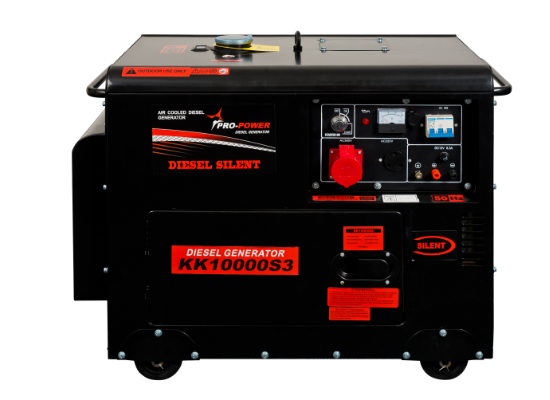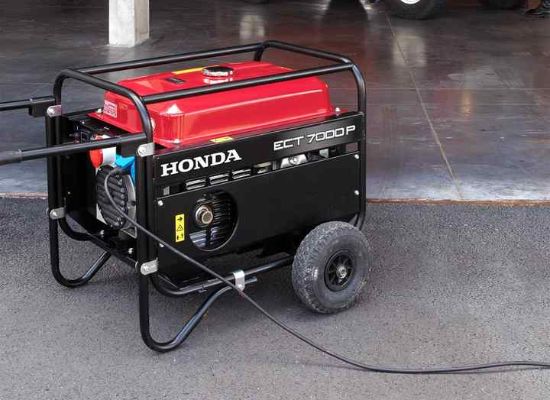Generator Installers and suppliers Witbank
- Diesel and Petrol Generators
- Fully integrated installations
- Mobile and Static Generators
Are you tired of load shedding? Is load shedding killing productivity? Then it might be time to install a Backup Generator. Installing a backup generator has many advantages
- Provides electricity for medical devices
- Eliminates production losses during load-shedding
- Keeps your fridge and freezer running
General types of Generators
When a blackout or load shedding makes it impossible for the grid to transmit electricity to your home a generator serves as backup power. Generators operate by burning fuel and converting the energy that is produced by the engine to electrical energy that can be used to power electrical equipment
Generators come in two primary forms: Portable and Standby / Fixed:
Portable Generators
Portable generators are mostly powered by petrol. These generators are generally used to provide power offsite or to power some outlets during a blackout. Most portable generators
- Are only sufficient to power some outlets
- Are pull start but some models do have electrical starters
- Should only be placed outside due to exhaust fumes
- Can easily be transported
- Can be wired into DB or can provide power to electrical equipment via extension cord.
.
Standby Generators or fixed Generators
Are installed outside your home or business and will switch automatically between grid power and standby power. Standby Generators are
- Mostly Powered by Diesel or Petrol
- Have an Integrated starter and battery to start the generator when there is a backup
- Are permanently installed in a fixed location
- Will be wired into DB board and will switch over automatically if there is a power outage
Depending on the size of the generator you opt for you can select to only power certain equipment and appliances or the whole premises.
Why should I buy a standby generator or fixed generator instead of a portable generator?
- Are generally safer than Portable units
- Starts automatically within seconds of the grid failing
- Provides 24/7 protection even when you are not home
- Are quieter to run than gasoline units
- Carbon Monoxide fumes are ventilated properly limiting the risks of carbon monoxide poisoning


Advantages of having a Backup Generator
Anytime the power goes out – whether from load shedding or a storm or any other grid failures – your generator will be able to supply power to your home or business. This provides numerous advantages
- Avoid food spoiling, by enabling you to keep the refrigerator and freezer running.
- Can keep the climate control running enabling a comfortable workspace or home
- Despite the power outage the home security system will continue to run
- Can help protect computers and other appliances by eliminating power spikes when the grid starts up after an outage.
- Improved safety with maintained lighting
- Provides electrical access for essential medical equipment
- Can help reduce production losses due to load shedding and other power outages.
Generator Installations, Explained Step by Step
Choose a Location where the generator will be installed. The Location should be:
- A stable well-drained area that does not flood.
- Enough clearance around the generator to service or do repairs to the generator
- Should be not closer than 2 metres from the property boundary
- Should be more than 2 metres from the closest window
Prepare a base for the generator – Prepare a base for the generator by casting a concrete slab or by laying down a layer of gravel contained by a small retaining wall.
Installing the generator – Once the base has been prepared it is time to install the generator securely on the base.
Connecting the fuel and electrical – Once the Generator is in place the step is to connect it to the house’s Distribution board and connect the fuel line to an external fuel source if there is any.
Testing and Outage Simulation – It is now time to test the generator ensuring it automatically starts when there is a power outage.
Issuing of COC certificate – Once installation is completed and tested a COC certificate can be issued for the installation.
The total time for installing a standby or fixed Generator can range from 2 to 4 days depending on the size of the generator and the intricacy of the installation.
FAQ
How much noise does a generator make?
Regular portable generators mounted on an open steel frame make the most noise starting at about 75 dBA and up to about 85 dBA, depending on the size of the generator and the model. Fixed Standby Generators make a lot less noise arranging from 60 – 70 dBA making them a better solution for a permanent solution especially if the generator is placed close to a residence or workplace.
What is the average running cost of a generator?
The average running cost of a petrol-powered generator is about R5,00 per kWh and larger diesel generators’ operating costs range from R3,50 to R4,00 per kWh
Do I need a COC certificate for my generator installation?
Yes if any modification is made to your current electrical system a new COC inspection should be performed if the previous COC inspection was performed more than 3 months prior the whole electrical installation will have to be revised again.
What size generator do I require for my Home or Small Business?
A 5.5kVa generator is normally sufficient for a home or small business when not utilizing any heating devices like stoves, geysers or electrical kettles.
Do I need an Electrician to install my generator?
Yes, you need an electrician any time an alteration is made to your premises’ electrical installation. You can opt to do the physical installation of the generator your self but you will require an electrician to connect the device to your installation
Why select a GP Electrician agent to install your Generator?
It can often be hard to find a reliable company when looking for someone to install a generator. That is why we vetted and selected various companies across South Africa to join our team. There are many advantages to working with a GP Electricians Partner.
- Customer satisfaction is a priority
- Qualified electricians with many years of experience
- Competitively Priced without sacrificing quality
- Obligation-free transparent quotes
- COC certificate issuing on completion
- Vetted contractors
- Great at balancing affordability with quality
- Great advice on selecting the right generator for your purpose.
Die Heuwel | Jackaroo Park | Hoeveld Park | Reyno Ridge | Tasbet Park | Del Judor | Kwaguqa | Naaupoort
How much does it cost to service a Generator?
A generator can cost from R6000 – R50000+ for Home or Small Business use.
With a 5.5kVA portable generator with no integration into the electrical installation costing about R9000 – R15000 depending on the brand of Generator.
Integrating the generator into the DB board with a manual changeover switch adds an additional R4000 – R5000 to the price.
And finally, the same size generator with automatic start and changeover is priced from R25000 with installation costs ranging from R10000,0


